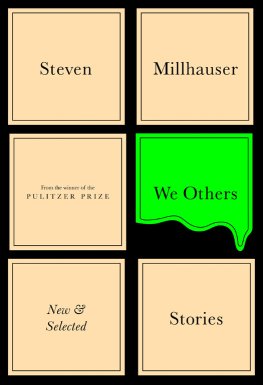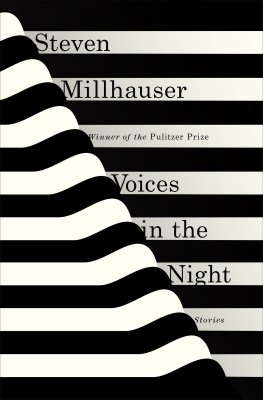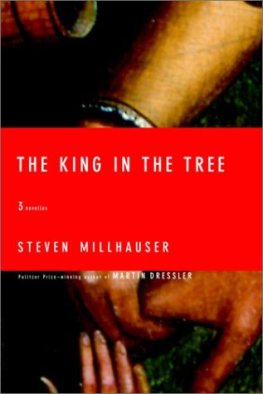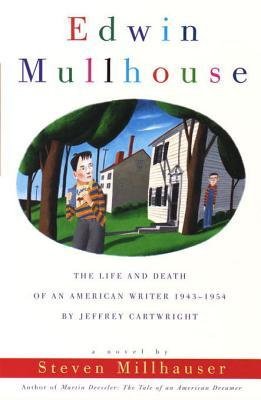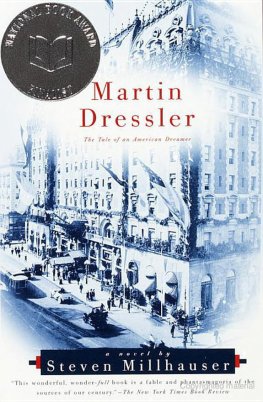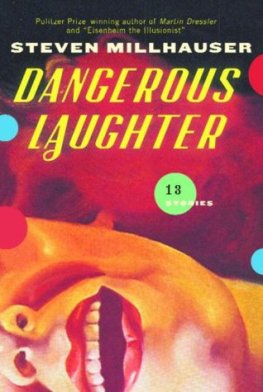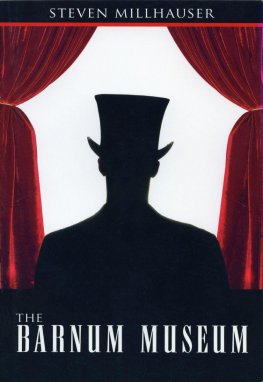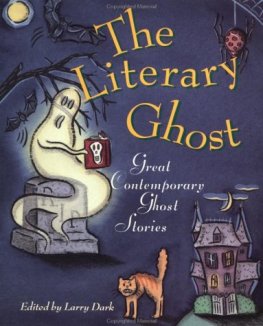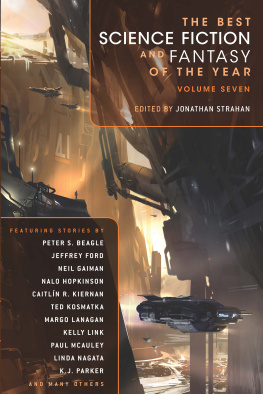Steven Millhauser
We Others: New and Selected Stories
The stories in this collection were written over a period of thirty years. At first I tried to choose stories that seemed to me representative, but I soon realized that the ones omitted from the collection might represent me just as well. My final method had nothing to do with being cautious or dutiful. I chose stories that seized my attention as if theyd been written by someone whose work I had never seen before. What makes a story bad, or good, or better than good, can be explained and understood up to a point, but only up to a point. Whats seductive is mysterious and can never be known. I prefer to leave it at that.
WALTER LASHER. One September evening when Walter Lasher returned from the city after a hard days work and was walking to his car in the station parking lot, a man stepped out from between two cars, walked up to him, and slapped him hard in the face. Lasher was so startled that he did not move. The man turned and walked briskly away. Lasher was a big man, six one, with broad shoulders and a powerful neck. No one had dared to hit him since the sixth grade. He remembered it still: Jimmy Kubec had pushed him in the chest, and Lasher had swung so hard that he broke Kubecs nose. Lasher looked around. The man was gone, a few commuters were strolling to their cars. For a moment he had the sensation that hed dreamed the whole thing: the sudden appearance of the stranger, the slap, the vanishing. His cheek stung: the man had slapped him hard. Lasher entered his car and started home. As he passed under the railroad trestle, crossed Main, and drove along streets lined with maples and sycamores, he kept summoning the little scene in the station parking lot. The man was about five ten, well built, tan trench coat, no hat. It was difficult to remember his face, though hed made no attempt to hide it and in fact had looked directly at Lasher. What stood out was something about the eyes: a hard, determined look; not rage, exactly more like a cold sureness. The man had hit him once: hard. Then he had walked away. Lasher pulled over to the side of the road and checked his face in the rearview mirror. He wasnt certain, but the cheek looked a little red. He pulled back onto the street. The man must have mistaken him for someone else. A crazy guy, some loony off his meds, they should keep them locked up. But he hadnt looked crazy. Maybe a client, in over his head, unhappy with the performance of his investment portfolio in a tanking market. Or maybe Lasher had offended someone without knowing it, the man had followed him up from the city, and all because of a sharp word, an impatient look, a biting phrase, he had no time for fools, a bumped arm in the street. The man had looked directly at him. Lasher would talk it out with his wife. Theyd lived here for twenty-six years and nothing like this had ever happened to him. It was why you stayed out of the city, took the long commute. A few blocks from the beach he turned onto his street, where the lights were already on. They must have come on all over town while he was driving from the station. How could he have missed it? The man had taken him by surprise. He hadnt had time to react. He didnt like the mans eyes, didnt like the thought of himself standing there doing nothing. It was probably too late to call the police the man would already be far away. Anna would know what to do. Lasher pulled into the drive and sat motionless in the darkening car. The man had looked hard at him: there was no mistake. He should have smashed him in the mouth. Jimmy Kubec had worn a bandage on his face for two weeks. Lasher walked across the flagstones and up the steps of the front porch. In the hall he could smell roast beef and basil. Hed save his misadventure for after dinner. The man had come right up to him and slapped him: hard. As Lasher hung up his hat he understood that he would not speak of it to Anna, who was coming toward him. Katie called shes coming on Saturday. I said it was fine. I mean, what else could I do? Oh, and Jenkovitch left a message. He says he never can get hold of you. He wants you to call him back. Here, give me that. How was your day?
OUR TOWN. Our town is bordered on the south by a sandy public beach that faces the waters of Long Island Sound and on the north by a stretch of pine and oak woods. To the east lies an industrial city, where streets of crumbling brick factories with smashed windows give way to neighborhoods of new ten-story apartment complexes rising above renovated two-family houses with porches on both floors. To the west lies a wealthy town of five-bedroom homes set back on rural lanes, with a private beach, a horse-riding academy with indoor and outdoor practice rings, and a harbor yacht club where powerboats and racing sailboats are moored on floating docks. We like to think of ourselves as in the middle: well off, as things go, with pockets of wealth at the shore and on Sascatuck Hill, but with plenty of modest neighborhoods where people work hard and struggle to make ends meet. In this way of thinking theres a certain amount of self-deception, of which were perfectly aware it pleases us to think of ourselves as in the middle, even though, as statistics show, were well above the national average in per capita income. Although were on the commuter line to Manhattan, many of us work right here in town or in small cities not more than half an hour away. For the most part our lawns are neat, our streets well paved, our trees trimmed once a year by men in orange hats who stand in baskets at the ends of high booms. Our school system is one of the best in the county we believe in education and pay our teachers well. Our Main Street is lively, with cafs and restaurants and a big department store, despite the new mall out by Route 7. Because were on the commuter line, we dont feel shut away from the center of things, as if we were stuck up in Vermont or Maine, though at the same time were happy to be out of the city and take pride in our small-town atmosphere of tree-shaded streets, yard sales, and the annual fire department dinner. But make no mistake, theres nothing quaint about us, what with our new semiconductor headquarters and our high-end boutiques, unless its our seventeenth-century town green, with a restored eighteenth-century inn where George Washington is supposed to have spent the night. Most of us know were lucky to live in a town like this, where crime is low and the salt water is never more than a short drive away. We also understand that to someone from another place, to someone who is disappointed or unhappy, someone for whom life has not worked out in the way it might have, our town may seem to have a certain self-satisfaction, even a smugness. We understand that, for such a person, there may be much to dislike, in a town like ours.
AT NIGHT. In the middle of the night Walter Lasher woke beside his wife and immediately recalled the episode on the playground that had taken place forty-two years ago. He saw Jimmy Kubec with startling vividness: the thick black combed-back oily hair, the loose jaunty walk, the mocking mouth, the large long-lashed eyes. Kubec had long thin biceps, with a vein running down along each upper arm. He wore black jeans and a tight white T-shirt with the sleeves rolled up to his shoulders. He walked toward Walter, looking at him with a little taunting smile, and as he approached he held up the palm of one hand and made a pushing gesture at the air. He did not touch Walter, who nevertheless felt the mockery and the challenge. Walter had grown six inches over the summer. His shoulders were filling out, and he felt an energy in his arms that was almost like anger. The mocking little gesture cut into him like glass. He walked up to Jimmy Kubec and smashed him in the face. He could see the surprise and pain in Kubecs dark eyes, the blood streaming from the broken nose, the look that seemed to say: Why did you do that to me? Kubec had no friends. He stayed out of Walters way after that, standing alone by a tree in a corner of the schoolyard. Lasher lay in bed and thought: Could it have been him, after all these years? The idea was absurd. The man in the trench coat had sandy hair, sharp features, grayish or bluish eyes. It must have been someone else, someone who had it in for him. He saw it again: Jimmy Kubec coming toward him, the veins in his arms, the little pushing gesture in the air. Kubec hadnt touched him. All that was in another time, another life. Anna lay with her back to him, her hair rippling over the pillow. On the street a car passed, sending a thin bar of light across one wall and up along the ceiling.

